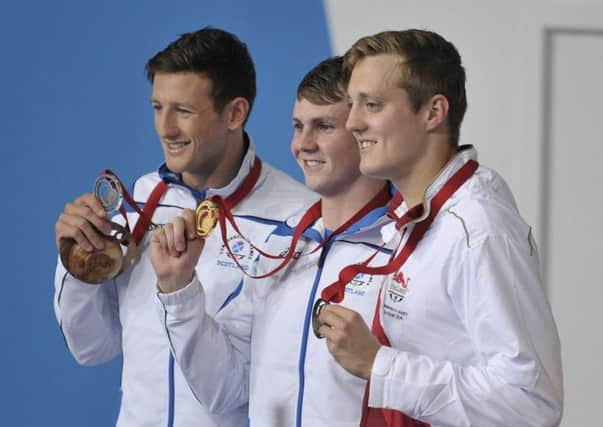Stuart Bathgate: Scottish sport’s finest Thursday


Commonwealth Games Scotland have a simple target for these Games of at least 34 medals, one more than the current record, set in Edinburgh in 1986. In private, they may hope for a good few more but, even if that is the case, they can hardly have expected to reach double figures with barely 12 hours gone of the competitive events.
This was Scotland’s equivalent of Super Saturday, the evening at the London Olympics two years ago when Jessica Ennis, Greg Rutherford and Mo Farah all won gold medals. It was the finest two hours in the history of British athletics.
Advertisement
Hide AdAdvertisement
Hide AdThere have been greater individual achievements in Scottish sport than anything we saw two days ago, with Chris Hoy’s Olympic triumphs being the most obvious example. But, as a joint effort, Thursday was without parallel.
If you had been watching it on TV, you might have thought it had all been carefully scripted. Everything that could go right did go right. Everyone who potentially stood in the way of Scottish athletes’ hopes was unable to mount a lasting challenge.
In the pool, England’s Andrew Willis and Aimee Willmott were genuine contenders for gold. They won medals, all right, but had to be content with a bronze and a silver respectively.
At the SECC, of course, several judo players got the better of the Scots contingent, whose overall tally was two golds, a silver and three bronzes. But the Renicks sisters both won, joining Hannah Miley and Ross Murdoch as Scotland’s golden quartet.
The fact that it was Murdoch, not Michael Jamieson, who took that gold in the 200 metres breaststroke added to the emotional complexity of the evening. There was an unusual mixture of emotions at the Tollcross International Swimming Centre, quite different to what would have been the case had Jamieson won and Murdoch come second.
The majority of the crowd had come to see Jamieson win. Not only is he from Glasgow, he is – or was – a more established star than his younger countryman. And, having finished second in the Olympics, beaten only by a world-record swim from Hungary’s Daniel Gyurta, he was ready to triumph on home ground. Wasn’t he?
As it turned out, he was not. So there was shock, and deflation, for the crowd, mixed up by the elation of seeing another Scot win.
It will be no consolation to Jamieson, but the fact that Murdoch rose so spectacularly to the occasion was another reason why Thursday was so impressive. Every athlete, in every sport, talks about peaking for major events. Very few of them do so with such impressive precision as the 20-year-old from Balfron.
Advertisement
Hide AdAdvertisement
Hide AdOf course, just as our competitors planned to be at their best around now, so the Games organisers carefully planned the event to go this way. They could do that because in two different respects – choice of sports and then the scheduling of events – the host nation has a big say in what happens on the opening day.
We should bear in mind that there was only one difference between the roster of 17 sports proposed by Glasgow and that on offer from Abuja, its only rival to host the Games. The Nigerian capital included basketball on its programme, Glasgow preferred triathlon.
Scotland was not expected to win any triathlon medals in either the men’s or women’s races, and that is how it turned out, despite the heroic efforts of Marc Austin to stick with the Brownlee brothers. So, in that respect, the home nation cannot be accused of selecting sports which other countries have no interest in simply because it fancies its own chances.
But, having said that, the return of judo for the first time since Manchester 2002 was always going to be a big boost to Scots hopes. It was our biggest single source of medals 12 years ago and, since then, the squad, based at Ratho just outside Edinburgh, have grown steadily stronger. They proved that much with six medals on day one.
As for the scheduling of events, it was no coincidence that Michael Jamieson’s strongest event, the 200 metres breaststroke, should be held on the first evening – reversing the usual procedure at major championships of holding the 100m first. And the women’s para tandem event, in which Aileen McGlynn and pilot Louise Haston won silver, was also planned for the opening day in the velodrome for a very good reason.
But, in nearly every major event – whatever the sport, the host nation has similar advantages. And, anyway, they do not always translate into early medals, as was shown at London 2012, when the expected day-one victories – or at least podium finishes – did not materialise for Hannah Miley and Mark Cavendish. Several anxious days followed in which Team GB continued without a gold medal.
But, given the strength of the home squad two years ago, of course there were going to be gold medals in the end. And, given the Olympic programme goes on for 17 days, the lack of gold on days one, two or three did not prove to be a lasting problem. In Glasgow 2014, by contrast, there are only 11 days of action, increasing the desirability of getting off to a flying start. Team Scotland achieved that all right, to stratospheric proportions.
SEE ALSO: